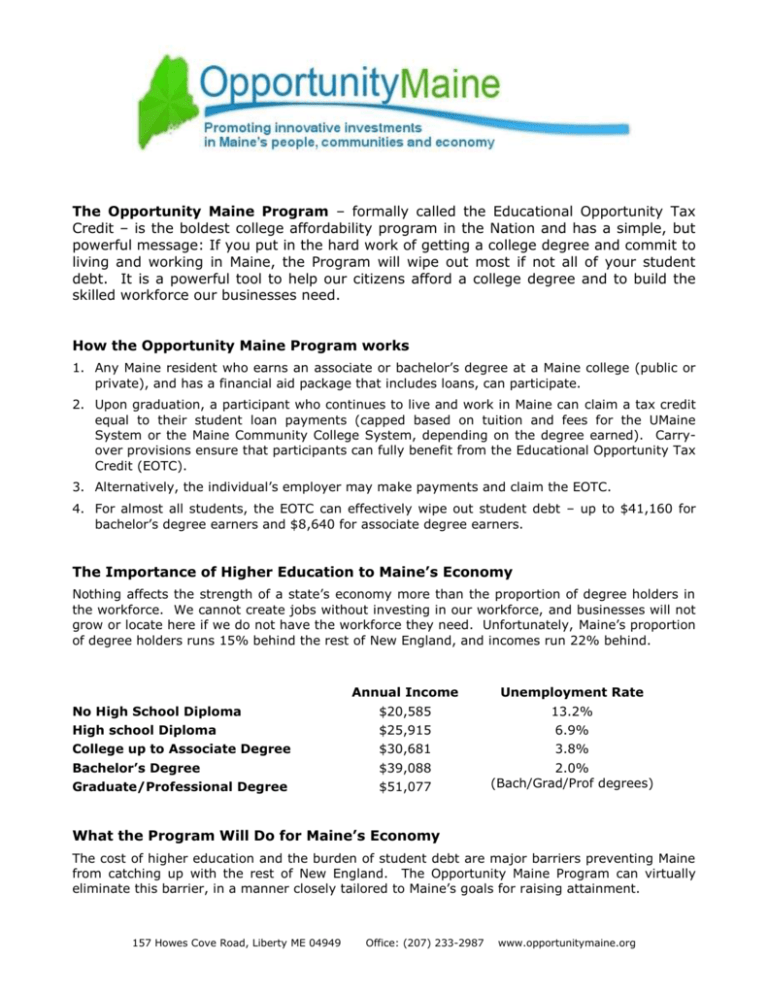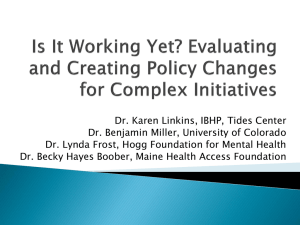Opportunity Maine Program Summary
advertisement

The Opportunity Maine Program – formally called the Educational Opportunity Tax Credit – is the boldest college affordability program in the Nation and has a simple, but powerful message: If you put in the hard work of getting a college degree and commit to living and working in Maine, the Program will wipe out most if not all of your student debt. It is a powerful tool to help our citizens afford a college degree and to build the skilled workforce our businesses need. How the Opportunity Maine Program works 1. Any Maine resident who earns an associate or bachelor’s degree at a Maine college (public or private), and has a financial aid package that includes loans, can participate. 2. Upon graduation, a participant who continues to live and work in Maine can claim a tax credit equal to their student loan payments (capped based on tuition and fees for the UMaine System or the Maine Community College System, depending on the degree earned). Carryover provisions ensure that participants can fully benefit from the Educational Opportunity Tax Credit (EOTC). 3. Alternatively, the individual’s employer may make payments and claim the EOTC. 4. For almost all students, the EOTC can effectively wipe out student debt – up to $41,160 for bachelor’s degree earners and $8,640 for associate degree earners. The Importance of Higher Education to Maine’s Economy Nothing affects the strength of a state’s economy more than the proportion of degree holders in the workforce. We cannot create jobs without investing in our workforce, and businesses will not grow or locate here if we do not have the workforce they need. Unfortunately, Maine’s proportion of degree holders runs 15% behind the rest of New England, and incomes run 22% behind. Annual Income Unemployment Rate No High School Diploma $20,585 13.2% High school Diploma $25,915 6.9% College up to Associate Degree $30,681 3.8% Bachelor’s Degree $39,088 Graduate/Professional Degree $51,077 2.0% (Bach/Grad/Prof degrees) What the Program Will Do for Maine’s Economy The cost of higher education and the burden of student debt are major barriers preventing Maine from catching up with the rest of New England. The Opportunity Maine Program can virtually eliminate this barrier, in a manner closely tailored to Maine’s goals for raising attainment. 157 Howes Cove Road, Liberty ME 04949 Office: (207) 233-2987 www.opportunitymaine.org Attainment strategy How the Opportunity Maine Program helps Enroll more high school graduates in college The promise of wiping out student debt can lower or eliminate financial barriers to enrollment Enroll more college See above. Maine cannot catch up with New England unless working adults make up a large portion of our new degree earners over the next decade. working adults in Raise degree completion rates Students can only use Opportunity Maine to eliminate their debt if they graduate. This is a huge incentive. Get more of our graduates to start their careers, businesses and families in Maine The burden of student debt drives many graduates to higher-salary regions. Surveys show that many who leave would stay in Maine if debt were removed from the equation. Opportunity Maine does this. Promote in-migration to attend Maine colleges and settle here Maine colleges can offer a huge benefit that virtually none of their New England competitors can match. This long term investment in the knowledge and skills of Maine’s workforce will result in greater job, wage, and economic growth. The program will ultimately pay for itself, with the tax credits that individuals and businesses receive being more than offset by higher tax revenues generated by higher paying jobs and economic spillover effects. For Maine’s students The Opportunity Maine program is a bold promise to reward hard work with educational and economic opportunity. It will expand the number of Mainers who believe they can tackle – and afford – an associate or bachelor’s degree. For Maine’s working college graduates, it will provide an average tax credit of $2,900 for bachelor’s degree earners ($800 for associate degree earners) for the life of their student loans. For Maine’s employers Over time, Maine’s employers will have access to one of the best trained workforces in the country, and have a strong competitive advantage over similarly situated firms in other states. By using the EOTC, employers can support existing and new employees gain the education they need by paying the student loans and taking the tax credit themselves, earning a substantial reduction in their tax burden. Realizing the Opportunity Maine Program’s Promise The Program has the potential to transform Maine’s economy, and the potential is just starting to be realized. Starting in 2011, colleges are required by law to inform students about the Program and report their efforts and results to the Dept. of Education and the legislature’s Education & Cultural Affairs Committee. Starting in 2013, the EOTC will be refundable for those who earn a degree in the STEM fields and businesses can offer this benefit to their employees whether they earned their degree in or out of state. Now that Maine has undertaken the boldest college affordability initiative in the country, we must follow through on implementing it and make the promise a reality for Maine people and businesses. 2 Fiscal and Economic Effects of College Attainment – Summary of Findings Philip A. Trostel & Todd M. Gabe School of Economics & Margaret Chase Smith Policy Center University of Maine School of Economics Staff Paper # 566 March 2007 To read the full report, go to www.opportunitymaine.org Our analysis examines the fiscal (i.e., tax revenues and government spending) effects of college attainment, as well as the importance of an educated workforce to business and economic development. The report was written to contribute to the debate about Opportunity Maine and the likely consequences of a more educated workforce and citizenry in Maine. On average, earnings rise significantly with educational attainment, producing higher state revenues. At the same time, educational attainment reduces public spending on Medicaid, antipoverty programs, incarceration and unemployment compensation. The key findings are: College education pays for Maine people In Maine, holders of associate’s degrees earn 39 percent more than high school graduates, and holders of bachelor’s degrees earn 63 percent more than high school graduates. Bachelor’s degree holders in Maine thus earn $16,245 more on average than high school diploma holders. Educational attainment is a key determinant of economic vitality The proportion of Maine’s working-age population with at least a bachelor’s degree is 23 percent below the New England average (and 30th among the states). Maine’s per capita income is 25 percent below the New England average (34 th among states). Maine ranks last in New England on both scores. Although a single explanation oversimplifies a complex issue, there is little doubt that the development of a higher-skilled workforce in Maine is one of the most important issues, if not the most important issue, for the state’s prosperity growth. College education pays for the state In Maine, the average additional state and local tax revenues per bachelor’s degree are more than $2,112 annually. Over a 45-year working lifetime, this is about $95,035. The slight progressivity of Maine’s tax code and additional taxes paid after retirement add to this figure. College education reduces state and local government spending and taxes Medicaid is an expensive program, so a college differential can translate into big bucks. Indeed, the largest fiscal impact of college attainment, other than the increased tax revenues, appears to be Medicaid-related savings. Nationwide, the fiscal savings in Medicaid is about $470 annually per bachelor’s degree, and more than $21,000 over 45 years. The figure would be much higher in Maine. 3 Nationwide, the fiscal savings in incarceration costs is about $358 annually per bachelor’s degree. Incarceration rates are 11.3 times higher among high school diploma holders than among bachelor’s degree holders. Maine has particularly high incarcerations costs per prisoner, so the savings differential is considerably larger in this state. Nationwide, the fiscal savings in state unemployment compensation is about $46 per year per bachelor’s degree, adding up to more than $2,000 over a 45-year work horizon. The savings would be higher in Maine. Nationwide, the fiscal savings in terms of public cash assistance is about $31 annually per bachelor’s degree, and is much higher in Maine. In addition, nationwide, high school graduates are 2.9 times more likely to receive child-care assistance than college graduates, and 4.3 times as likely to receive transportation assistance. Nationwide, the average high school diploma holder receives $69 more per year in worker’s compensation than the average bachelor’s degree holder. The difference is higher in Maine. College education enhances economic development Businesses consistently cite an educated workforce as a key determinant of business location, growth, and profitability. For example, in the Maine Development Foundation’s 2001 survey of Maine businesses, 42 percent of respondents listed “educated workforce” as the most important issue for long-run economic growth in the state, well ahead of all the other choices. 28 percent of respondents listed “educated workforce” as the second most important factor. A highly educated workforce is essential in attracting and creating high-tech businesses and jobs. Of respondents to a 2003 Maine biotechnology industry survey, 81 percent listed “educated workforce” as a factor impacting their profitability or growth potential. Promoting college education is essential in the development of the “creative economy.” Nationwide, a one-percentage point increase in the proportion of county residents with a college degree leads to an increase in per-worker earnings of $78.20 to $86.11. 4







